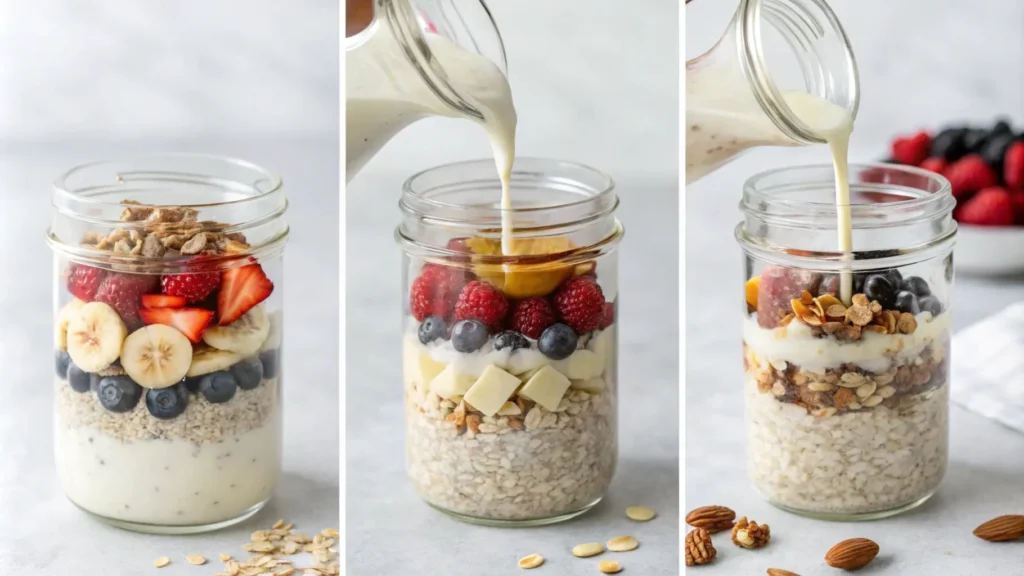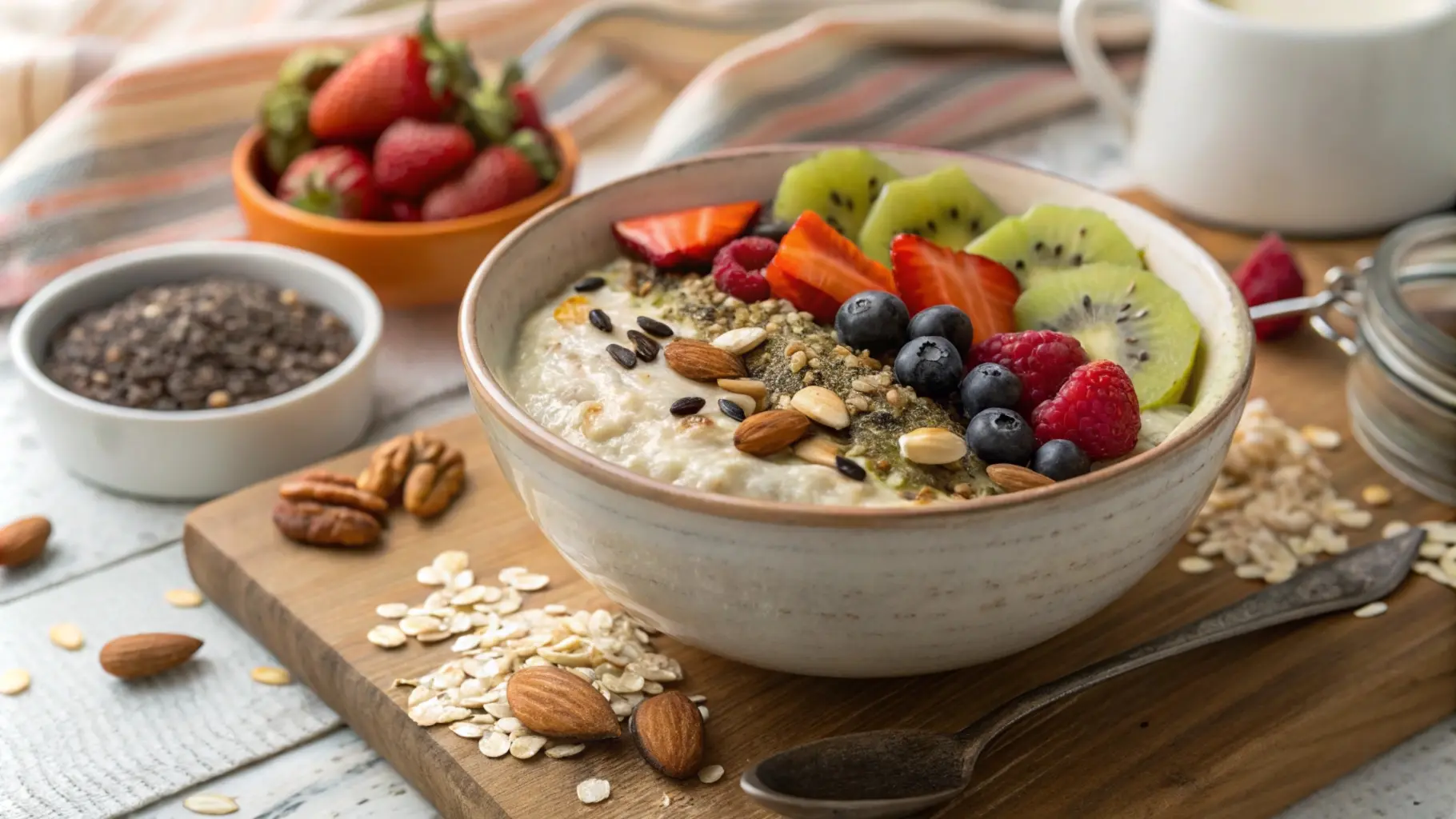Overnight oats have surged in popularity as a quick, nutritious breakfast option. Whether you’re rushing out the door or meal-prepping for the week, these no-cook oats are touted as a healthy way to start the day. But are overnight oats actually healthy? This article will break down their nutritional profile, explore the health benefits and potential downsides, and compare them to cooked oats. You’ll also discover how to make them even healthier and hear expert insights to help you decide if overnight oats are right for you.
Introduction to Overnight Oats
What are overnight oats?
Overnight oats are a simple, no-cook oatmeal made by soaking rolled oats in milk, yogurt, or a plant-based alternative overnight. By morning, the oats become soft and creamy, ready to eat without any cooking. This makes them a quick and easy breakfast option for busy mornings.
Making overnight oats is as easy as it gets. Combine oats with your choice of liquid, mix in toppings like fruits, nuts, or seeds, and let them chill in the fridge overnight. You can prepare them in jars or containers, making them perfect for grab-and-go meals. The best part? You can adjust the flavors and ingredients to suit your taste and nutrition goals.
The rise in popularity of overnight oats
So why are overnight oats so popular? First, they’re super easy to make—just prepare them the night before, and breakfast is ready when you wake up. Second, they’ve taken over social media, with photos of colorful and creative oat jars filling Instagram and Pinterest feeds.
In today’s fast-paced world, people want meals that are quick, healthy, and tasty. Overnight oats check all those boxes. They’re high in fiber, easy to customize, and perfect for meal prep. But are overnight oats actually healthy? Let’s take a closer look to find out!
Nutritional Profile of Overnight Oats
Key nutrients in overnight oats
One of the biggest reasons overnight oats are considered healthy is their impressive nutritional profile. Oats are rich in complex carbohydrates, providing a steady release of energy throughout the day. They are also packed with dietary fiber, especially beta-glucan, which promotes digestion and keeps you feeling full longer.
In addition to fiber, overnight oats are a solid source of plant-based protein. While oats alone offer around 5 grams of protein per serving, combining them with milk, yogurt, or chia seeds boosts the protein content significantly. This makes overnight oats a well-rounded meal for both muscle repair and energy.
You’ll also find that oats are naturally rich in essential vitamins and minerals. They contain B vitamins for energy production, magnesium for muscle function, and iron for healthy blood circulation. Toss in some nuts, seeds, or fruits, and you’ll further amplify the nutritional value.
Comparing overnight oats to cooked oats
At this point, you may wonder: Are overnight oats actually healthy compared to cooked oats? The truth is, they’re nutritionally similar—when prepared the right way. Both versions of oats retain their fiber, vitamins, and minerals.
However, soaking oats overnight offers a couple of advantages. Firstly, it reduces the phytic acid content, making nutrients like iron and calcium easier for your body to absorb. Secondly, the soaking process gives overnight oats a creamier, softer texture without the need for cooking.
Cooked oats, on the other hand, may break down slightly faster in your body, providing a quicker energy release. If you’re someone who loves a warm breakfast, cooked oats might be the better option. That said, overnight oats win hands down when it comes to convenience and meal prep.
Health Benefits of Overnight Oats
High in fiber: Supporting digestion and fullness
One of the biggest benefits of overnight oats is their high fiber content. Fiber is key for a healthy digestive system, helping to prevent constipation and support good gut bacteria. Oats contain beta-glucan, a type of soluble fiber that keeps you feeling full for longer. This makes overnight oats a great choice for anyone looking to control their appetite or lose weight.
Adding fruits, seeds, or nuts to your oats increases their fiber and boosts overall nutrition. So, if you’ve been asking, “Are overnight oats actually healthy?”—their fiber content alone makes them a smart breakfast pick.
A good source of protein for muscle repair
Overnight oats can also be a solid source of plant-based protein. When you mix them with milk, yogurt, or even protein powder, the protein content increases significantly. Protein is important for repairing muscles, especially after exercise, and for keeping you feeling satisfied and energized.
For example, a serving of overnight oats paired with Greek yogurt can pack in 15–20 grams of protein. Topping them with chia seeds or nut butter adds even more protein and healthy fats. This makes overnight oats perfect for both busy mornings and post-workout meals.
Rich in vitamins and minerals: Boosting energy and immunity
Oats are naturally full of important vitamins and minerals that your body needs. They include:
- Magnesium: Helps muscles and nerves function properly.
- Iron: Supports healthy blood flow and energy levels.
- B vitamins: Aid in energy production and metabolism.
Adding toppings like fresh fruits or seeds provides even more nutrients and antioxidants that help fight inflammation and keep your immune system strong. For instance, berries add a powerful dose of antioxidants, while nuts offer healthy fats that support brain health.
Weight management benefits of overnight oats
If you’re aiming to lose or maintain weight, overnight oats can be a smart part of your diet. Their combination of fiber and protein helps you stay full for hours, reducing the urge to snack on less healthy foods.
Overnight oats are also naturally low in calories, as long as you avoid sugary toppings and sweetened milk. To keep them healthy, stick to nutrient-packed ingredients like fruits, seeds, and nuts.
So, are overnight oats actually healthy? The answer is a clear yes—when you use simple, wholesome ingredients. They’re filling, nutritious, and perfect for a balanced breakfast.
Potential Downsides of Overnight Oats
Anti-nutrients: Are overnight oats harder to digest?
Despite their many benefits, are overnight oats actually healthy for everyone? One concern is the presence of phytic acid—an anti-nutrient found in oats. Phytic acid can bind to minerals like iron, zinc, and calcium, reducing their absorption in your body. While soaking oats overnight lowers phytic acid levels, it doesn’t eliminate them entirely.
For most people, this isn’t a major issue. However, if you struggle with mineral deficiencies or digestive sensitivities, you may want to lightly cook your oats or pair them with nutrient-dense toppings to compensate for the loss.
Added sugars and calorie concerns in toppings
While overnight oats are healthy on their own, toppings can make or break their nutritional value. Many people add sweetened yogurt, honey, or chocolate chips, turning a nutritious meal into a sugar bomb. Even store-bought versions often come with unnecessary sugars and preservatives.
To keep things healthy, choose unsweetened options and use natural sweeteners like fruits or cinnamon. Nuts, seeds, and chia seeds can also add flavor and crunch without the extra sugar. So, while overnight oats are healthy, preparation plays a crucial role in their benefits.
Who might need to limit overnight oats?
Not everyone benefits equally from overnight oats. Individuals with gluten sensitivities should ensure they’re using certified gluten-free oats, as cross-contamination is common. Similarly, people following low-carb diets might find oats too high in carbohydrates for their goals.
If you find yourself feeling bloated after eating oats, try smaller portions or experiment with pre-soaked oats, as this can make digestion easier. Ultimately, are overnight oats actually healthy for you? It depends on your body’s needs and how you prepare them.
Overnight Oats vs. Cooked Oats: Which is Better?
Nutrient absorption differences
When comparing overnight oats to cooked oats, one major difference lies in nutrient absorption. Soaking oats overnight reduces phytic acid, which can improve the availability of minerals like iron, magnesium, and calcium. This gives overnight oats a slight edge for anyone focusing on nutrient uptake.
On the other hand, cooked oats may be easier to digest for people with sensitive stomachs. The heat breaks down complex starches, which can make them gentler on the gut. If you experience discomfort with overnight oats, switching to cooked oats might be worth trying.
Taste, texture, and convenience factors
When it comes to texture, personal preference plays a big role. Overnight oats are creamy and cold, perfect for a refreshing summer breakfast. Meanwhile, cooked oats are warm, soft, and comforting, making them ideal for colder months.
Convenience is where overnight oats shine. You can prepare them in advance, making them perfect for busy mornings. Cooked oats, while quick, still require time and effort to prepare.
So, are overnight oats actually healthy compared to cooked oats? Both are great choices, but overnight oats take the lead for meal prep and ease of customization.
How to Make Overnight Oats Healthier

Choosing the right ingredients: Milk, yogurt, and sweeteners
When prepared thoughtfully, overnight oats can be a powerhouse breakfast. So, are overnight oats actually healthy? The answer depends on your ingredient choices. Start with a nutritious base like unsweetened almond milk, dairy milk, or Greek yogurt. These options add protein, calcium, and a creamy texture without unnecessary sugars.
Avoid flavored yogurts or sweetened milk, as they often contain added sugars that can quickly turn a healthy breakfast into a high-calorie treat. Instead, sweeten your oats naturally with fresh fruits, a dash of cinnamon, or a teaspoon of pure honey or maple syrup.
Adding nutrient-dense toppings: Fruits, nuts, and seeds
The toppings you choose can make overnight oats more nutritious and satisfying. Fresh fruits like bananas, blueberries, and apples provide natural sweetness along with vitamins, minerals, and antioxidants.
For added crunch and health benefits, sprinkle in nuts and seeds. Almonds, walnuts, and chia seeds offer healthy fats, protein, and omega-3s, which are great for your heart and brain health. Don’t forget flaxseeds—they’re loaded with fiber and can support digestion.
To level up the protein content, add a spoonful of nut butter or a scoop of protein powder. These additions make your oats filling and perfect for muscle recovery after workouts.
In short, if you’ve wondered, “Are overnight oats actually healthy?”, the key lies in smart, balanced ingredient choices. By focusing on whole foods and avoiding sugary additions, you’ll ensure your oats remain a nutrient-packed meal.
Expert Opinions on Overnight Oats
Dietitian insights on overnight oats
Health experts and dietitians widely agree that overnight oats can be a healthy and convenient meal option. According to nutritionists, their high fiber and protein content makes them perfect for promoting satiety and energy. They’re also praised for their versatility—allowing you to pack in essential nutrients with fruits, nuts, and seeds.
Registered dietitians also recommend soaking oats overnight to improve digestibility and reduce phytic acid. This process makes it easier for your body to absorb essential minerals like iron and magnesium. However, they caution against relying on store-bought versions, which may contain high amounts of added sugars and preservatives.
Scientific findings and studies on oats and health
Scientific studies consistently highlight the benefits of oats. They are a rich source of beta-glucan, a soluble fiber that helps lower cholesterol, stabilize blood sugar levels, and support heart health. Research also shows that regular oat consumption may reduce the risk of cardiovascular disease and improve overall gut health.
So, are overnight oats actually healthy according to science? Absolutely. Their combination of fiber, protein, and essential nutrients makes them an excellent breakfast choice. Just ensure you prepare them with wholesome, nutrient-dense ingredients to maximize their benefits.
Frequently Asked Questions (FAQs)
Are overnight oats good for weight loss?
Yes, overnight oats can be an excellent addition to a weight loss diet. Their high fiber content keeps you feeling full for longer, reducing the urge to snack on unhealthy foods. Adding protein-rich toppings like Greek yogurt, chia seeds, or almond butter can further increase satiety. However, to maximize benefits, avoid loading your oats with sugary toppings or sweetened milk. If prepared thoughtfully, are overnight oats actually healthy for weight loss? Absolutely!
Can overnight oats replace breakfast cereals?
Overnight oats are a much healthier alternative to most store-bought breakfast cereals. While many cereals are highly processed and loaded with added sugars, overnight oats are nutrient-dense and contain natural ingredients. By preparing them with fresh fruits, nuts, and seeds, you create a balanced meal rich in fiber, vitamins, and healthy fats. Plus, they’re just as convenient as cereal—perfect for busy mornings!
How long can you store overnight oats in the fridge?
You can safely store overnight oats in an airtight container for up to 4–5 days in the refrigerator. This makes them ideal for meal prep. To keep your oats fresh, use ingredients that don’t spoil quickly, like unsweetened milk and fruits that hold up well, such as apples or berries.
Are overnight oats suitable for gluten-free diets?
Yes, overnight oats can be gluten-free if you use certified gluten-free oats. Oats themselves are naturally gluten-free, but they are often processed in facilities that handle wheat, leading to cross-contamination. If you have gluten sensitivity or celiac disease, always check for a gluten-free label on your oats.
Conclusion
In conclusion, are overnight oats actually healthy? The answer is a definite yes—when prepared with nutritious, whole-food ingredients. Overnight oats are packed with fiber, protein, and essential vitamins and minerals that support digestion, energy, and heart health. They’re also incredibly versatile, allowing you to customize them with your favorite fruits, nuts, and seeds.
While there are minor concerns, such as added sugars and anti-nutrients, these can easily be avoided with mindful preparation. Whether you’re looking to manage your weight, improve digestion, or enjoy a quick, nutritious breakfast, overnight oats offer a simple and delicious solution.

